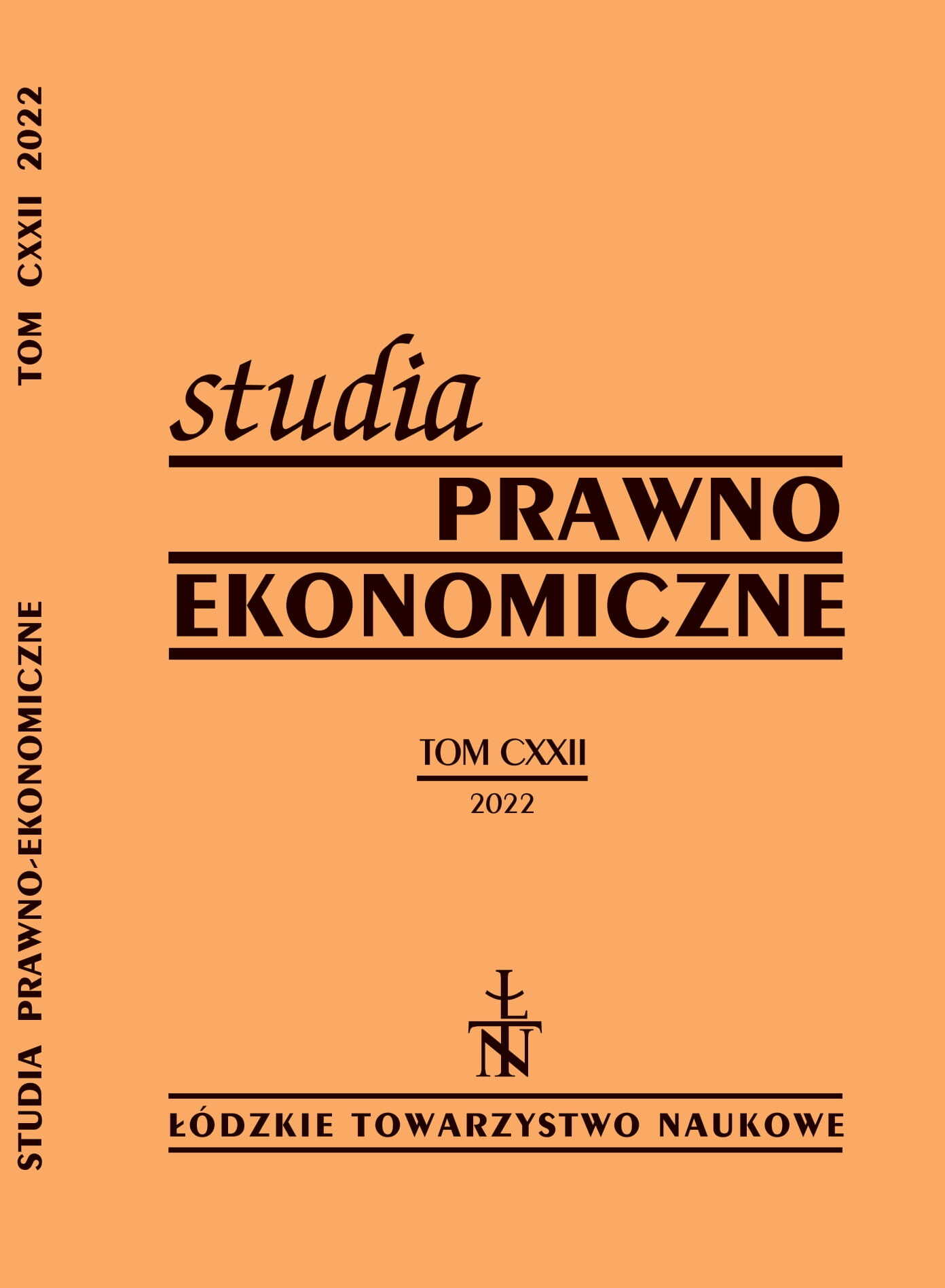Permanent establishment in digital business
DOI:
https://doi.org/10.26485/SPE/2022/122/1Keywords:
permanent establishment, digitalising economy, e-commerce, digital presence, significant economic presenceAbstract
Background: As to the taxation of a permanent establishment (PE), current tax solutions based on the physical presence of an enterprise in the territory of another country have been developed for traditional enterprises that do not pursue their business digitally, especially on the Internet. However, electronic business is largely based on intangible property, such as algorithms and user data. The taxation of digital business is a global problem that is dealt with by the EU and the OECD, among others.
Research purpose: The paper is designed to introduce the relevance and the consequences of the new EU and the OECD proposals for taxation of income resulting from digitalising economy in light of the permanent establishment standards.
Methods: The paper analyses legal sources and working materials, in particular of EU Directives and OECD Reports or Statements before and after the BEPS Project. A comparative analysis of tax implications under the current and planned regulations regarding the permanent establishment in digital business has been performed.
Conclusions: The OECD Inclusive Framework decided to move away from the problem of digitization in favor of globalization, and away from taxation of the largest technology giants in favor of taxing the biggest and most profitable companies. The PE concept under the 2021 Compromise has taken a significantly simplified form compared to the traditional notion of PE requiring analysis of the physical presence
References
Adda M., Scandone F.S., Lorenzi U., The New Taxing Right under Pillar One: Preliminary Thoughts on Potential Implications for MNEs, International Transfer Pricing Journal 2021/1.
Altenburg N., Schlücke K., The New World of Pillar One – Practical Thoughts on the New Scope, International Transfer Pricing Journal 2022/1.
Anderson K., Should We Use Value Creation or Destination as a Basis for Taxing Digital Businesses? – Krister Andersson’s Comments on the 2018 Klaus Vogel Lecture Given by Professor Michael Devereux, Bulletin for International Taxation 2018/12.
Azam R., E-commerce Taxation and Cyberspace Law: Integrative Adaptation Model, Virginia Journal of Law & Technology Association 2007/12/5.
Basu S., Global perspectives on e-commerce taxation law, Burlington 2007.
Blum D., Permanent establishments and Action 1 on the digital economy of the OECD Base Erosion and Profit Shifting initiative – the nexus criterion redefined?, Bulletin for International Taxation 2015/ 6–7.
Brauner Y., Pistone P., Adapting current international taxation to new business models: two proposals for the European Union, Bulletin for International Taxation 2017/12.
CFE Fiscal Committee, Opinion Statement FC 1/2018 on the European Commission proposal of 21 March 2018 for a Council Directive on the common system of a digital services tax on revenues resulting from the provision of certain digital services, 2018, http://taxadviserseurope.org/blog/portfolio-items/opinion-statement-eu-commission-digitalservices-tax-proposal/; accessed 15.03.2022.
Chetcuti J.-P., The Challenge of E-commerce to the Definition of a Permanent Establishment: The OECD’s Respons, Inter Lawyer 2002.
Collin P., Colin N., Task Force on Taxation of the Digital Economy (Ministere de l’economie et des finances), 2013.
Cooper G.S., Building on the Rubble of Pillar One, Bulletin for International Taxation 2021/11–12.
Escribano E., Is the OECD/G20 BEPS Initiative Heading in the Right Direction? Some Forgotten (and Uncomfortable) Questions, Bulletin for International Taxation 2017/5.
Geurts M., Server as a permanent establishment?, Intertax 2000/28/4.
Hellerstein W., Jurisdiction to tax in the digital economy: permanent and Other establishments, Bulletin for International Taxation 2014/6–7.
Hongler P., Pistone P., Blueprints for a New PE Nexus to Tax Business Income in the Era of the Digital Economy, WU International Taxation Research Paper Series 2015/15.
Jamroży M., Janiszewska M., Permanent establishment as a foreign direct investment in Poland: identification of tax barriers in the context of new tax development, International Journal of Management and Economics 2021/2.
Krzemińska I., Propozycje opodatkowania znaczącej obecności cyfrowej w Unii Europejskiej, Krytyka Prawa 2019/11/2.
Li J., The Legal Challenges of Creating a Global Tax Regime with the OECD Pillar One Blueprint, Bulletin for International Taxation 2021/2.
Lipniewicz R., Jurysdykcja podatkowa w cyberprzestrzeni: model międzynarodowego opodatkowania dochodu, Warszawa 2018.
Morse S., Value Creation: A Standard in Search of a Process, Bulletin for International Taxation 2018/4–5.
Neuvel W., de Jong S., Uceda A., Profit Attribution Challenges in a Digital Economy – A Transfer Pricing Analysis of the EU Virtual Permanent Establishment Concept, International Transfer Pricing Journal 2018/9–10.
Olbert M., Spengel C., International Taxation in the Digital Economy: Challenge Accepted?, World Tax Journal 2017/1.
Panayi Ch., International Tax Law Following the OECD/G20 Base Erosion and Profit Shifting Project, Bulletin for International Taxation 2016/11.
Petruzzi R., Koukoulioti V., The European Commission’s Proposal on Corporate Taxation and Significant Digital Presence: A Preliminary Assessment, European Taxation 2018/9.
PwC, European Commission Proposals for Directives regarding fair taxation of the digital economy (“Digital Tax Package”), 2018, https://www.pwc.com/gx/en/about/assets/reponseec-proposals-digital-tax-package.pdf; accessed 15.03.2022.
Samari A., Digital Economy and Profit Allocation: The Application of the Profit Split Method to the Value Created by a “Significant Digital Presence”, International Transfer Pricing Journal 2019/1.
Schön W., Ten questions about why and how to tax the digitalized economy, Bulletin for International Taxation 2018/ 4–5.
Sheepard L., Digital Permanent Establishment and Digital Equalization Taxes, Bulletin for International Taxation 2018/4a.
Becker J., Englisch J., EU Digital Services Tax: A Populist and Flawed Proposal, Kluwer International Tax Blog, viewed 19 July 2018, http://kluwertaxblog.com/2018/03/16/eu-digital-services-taxpopulist-flawed-proposal/; accessed 15.03.2022.
https://ec.europa.eu/taxation_customs/fair-taxation-digital-economy_fi; accessed 15.03.2022.
https://www.oecd.org/tax/beps/about/; accessed 15.03.2022.
https://www.oecd.org/tax/beps-2015-final-reports.htm; accessed 15.03.2022.







